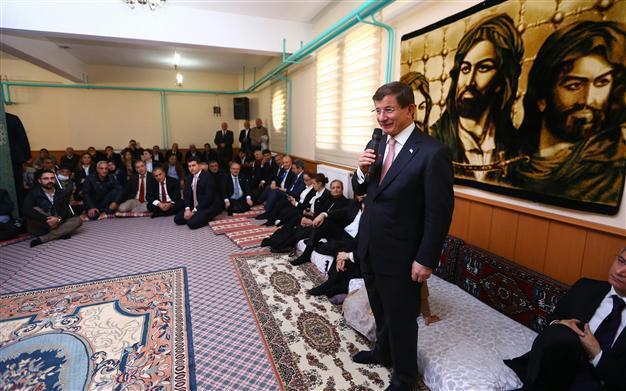Turkey discriminates against Alevis over worship places, Euro court says in landmark ruling
STRASBOURG

Turkish Prime Minister Ahmet Davutoğlu speaks at a cemevi during his visit to Tunceli in late November. AA Photo
Turkey’s public policies regarding cemevis, Alevi houses of worship, discriminate against the Alevi community, the European Court of Human Rights (ECHR) has stated in a landmark ruling.The Dec. 2 ruling comes after the Turkish government recently announced a fresh set of reforms aimed at answering the demands of Alevis. These reforms were greeted with considerable skepticism among Alevis, as they once again failed to recognize cemevis as official places of worship.
Turkey was sued at the ECHR by the Republican Education and Cultural Center Foundation – also known as the Cem Vakfı – which aims to publicize Alevi demands. The group claimed that the government’s policy of not paying the electricity bills of a cemevi in an Istanbul neighborhood, while doing so for mosques, churches and synagogues, was discriminatory.
The EHCR ruled in favor of the complainant, inviting the Turkish government to send a proposal regarding the cemevi in question.
One of the judges, meanwhile, called for the recognition of cemevis as a worship place with the same status as mosques or churches for a permanent solution.
“The question of the payment of electrical bills is closely linked to the fundamental question of the violation of state’s neutrality,” ECHR judge András Sajó said in his opinion regarding the case, which was included in the ruling.
“I therefore consider that the limited status conferred to cemevis by the [current] applicable legislation doesn’t allow the Alevi community to benefit … [from] their right to freedom of belief,” Sajó added.
Alevis, who are described as followers of the Caliph Ali, the nephew and son-in-law of the Prophet Muhammad, conduct religious practices distinct from Turkey’s Sunni majority.
In a recent trip to Tunceli (Dersim), an eastern Turkish province with a majority Alevi population, Prime Minister Ahmet Davutoğlu promised to stand strongly against discrimination toward the community and “personally follow” all acts of discrimination.
The Alevi community considers the lack of official status of cemevis as a fundamental issue, but the government has been reluctant to take steps on this question, despite a series of much-touted “Alevi openings.”
Prime Minister Ahmet Davutoğlu’s preliminary response to the Strasbourg court’s ruling was brief. “This is not a situation that will have impact on our efforts. We will move on our own path,” he said.
Meanwhile, in the same hour as Davutoğlu’s response was reported by state-run Anadolu Agency, it also reported that he would gather with representatives of the Alevi community later in the evening.
The prime minister was set to host Alevi opinion-makers over a dinner at the official prime ministry residence, Anadolu Agency reported, citing anonymous sources, while also noting that the meeting was planned after Davutoğlu’s visit to Tunceli. Justice Minister Bekir Bozdağ and Labor and Social Security Minister Faruk Çelik were also reportedly scheduled to attend the dinner.
For his part, main opposition Republican People’s Party (CHP) Tunceli deputy Hüseyin Aygün renewed Dec. 2 his earlier appeal to the Parliamentary Speaker’s Office for a cemevi to be established in Parliament.
Aygün had filed his first appeal to Parliamentary Speaker Cemil Çiçek’s Office back in 2012, which Çiçek refused.
In his refusal, Çiçek referred to the Office of the Head of Turkish Religious Affairs (Diyanet), which says the house of worship for Islam is the mosque and “Alevism is not a separate religion.”
In his renewed appeal, Aygün asked the Parliamentary Speaker’s Office to take the ruling, which states that Turkey’s public policies regarding cemevis discriminate against the Alevi community, into consideration.
















